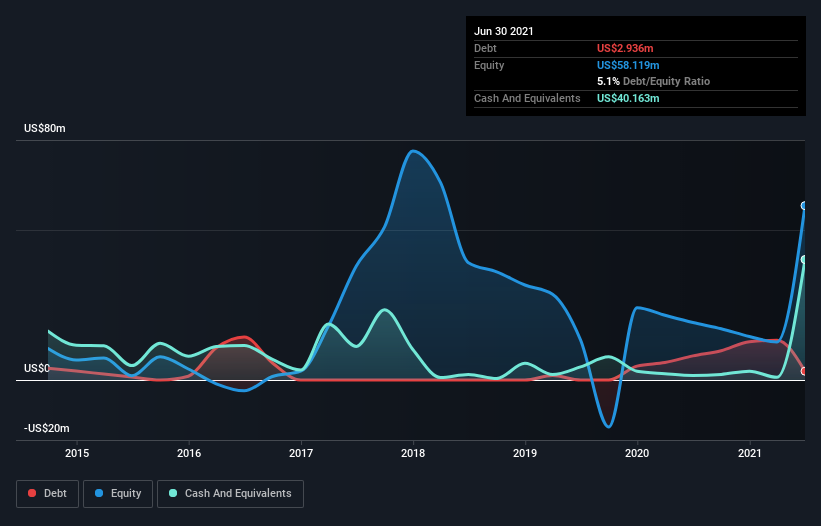Is ReShape Lifesciences (NASDAQ:RSLS) Using Debt Sensibly?
Howard Marks put it nicely when he said that, rather than worrying about share price volatility, 'The possibility of permanent loss is the risk I worry about... and every practical investor I know worries about.' When we think about how risky a company is, we always like to look at its use of debt, since debt overload can lead to ruin. Importantly, ReShape Lifesciences Inc. (NASDAQ:RSLS) does carry debt. But the real question is whether this debt is making the company risky.
When Is Debt A Problem?
Debt and other liabilities become risky for a business when it cannot easily fulfill those obligations, either with free cash flow or by raising capital at an attractive price. Part and parcel of capitalism is the process of 'creative destruction' where failed businesses are mercilessly liquidated by their bankers. However, a more usual (but still expensive) situation is where a company must dilute shareholders at a cheap share price simply to get debt under control. By replacing dilution, though, debt can be an extremely good tool for businesses that need capital to invest in growth at high rates of return. The first thing to do when considering how much debt a business uses is to look at its cash and debt together.
Check out our latest analysis for ReShape Lifesciences
What Is ReShape Lifesciences's Net Debt?
The image below, which you can click on for greater detail, shows that ReShape Lifesciences had debt of US$2.94m at the end of June 2021, a reduction from US$8.03m over a year. However, its balance sheet shows it holds US$40.2m in cash, so it actually has US$37.2m net cash.
How Strong Is ReShape Lifesciences' Balance Sheet?
The latest balance sheet data shows that ReShape Lifesciences had liabilities of US$60.5m due within a year, and liabilities of US$1.39m falling due after that. Offsetting these obligations, it had cash of US$40.2m as well as receivables valued at US$3.42m due within 12 months. So its liabilities outweigh the sum of its cash and (near-term) receivables by US$18.3m.
This deficit is considerable relative to its market capitalization of US$22.2m, so it does suggest shareholders should keep an eye on ReShape Lifesciences' use of debt. Should its lenders demand that it shore up the balance sheet, shareholders would likely face severe dilution. Despite its noteworthy liabilities, ReShape Lifesciences boasts net cash, so it's fair to say it does not have a heavy debt load! The balance sheet is clearly the area to focus on when you are analysing debt. But it is future earnings, more than anything, that will determine ReShape Lifesciences's ability to maintain a healthy balance sheet going forward. So if you're focused on the future you can check out this free report showing analyst profit forecasts.
In the last year ReShape Lifesciences wasn't profitable at an EBIT level, but managed to grow its revenue by 12%, to US$14m. That rate of growth is a bit slow for our taste, but it takes all types to make a world.
So How Risky Is ReShape Lifesciences?
Statistically speaking companies that lose money are riskier than those that make money. And in the last year ReShape Lifesciences had an earnings before interest and tax (EBIT) loss, truth be told. And over the same period it saw negative free cash outflow of US$7.8m and booked a US$22m accounting loss. With only US$37.2m on the balance sheet, it would appear that its going to need to raise capital again soon. Overall, we'd say the stock is a bit risky, and we're usually very cautious until we see positive free cash flow. When analysing debt levels, the balance sheet is the obvious place to start. However, not all investment risk resides within the balance sheet - far from it. Case in point: We've spotted 4 warning signs for ReShape Lifesciences you should be aware of.
If, after all that, you're more interested in a fast growing company with a rock-solid balance sheet, then check out our list of net cash growth stocks without delay.
This article by Simply Wall St is general in nature. We provide commentary based on historical data and analyst forecasts only using an unbiased methodology and our articles are not intended to be financial advice. It does not constitute a recommendation to buy or sell any stock, and does not take account of your objectives, or your financial situation. We aim to bring you long-term focused analysis driven by fundamental data. Note that our analysis may not factor in the latest price-sensitive company announcements or qualitative material. Simply Wall St has no position in any stocks mentioned.
Have feedback on this article? Concerned about the content? Get in touch with us directly. Alternatively, email editorial-team (at) simplywallst.com.

 Yahoo Finance
Yahoo Finance 
